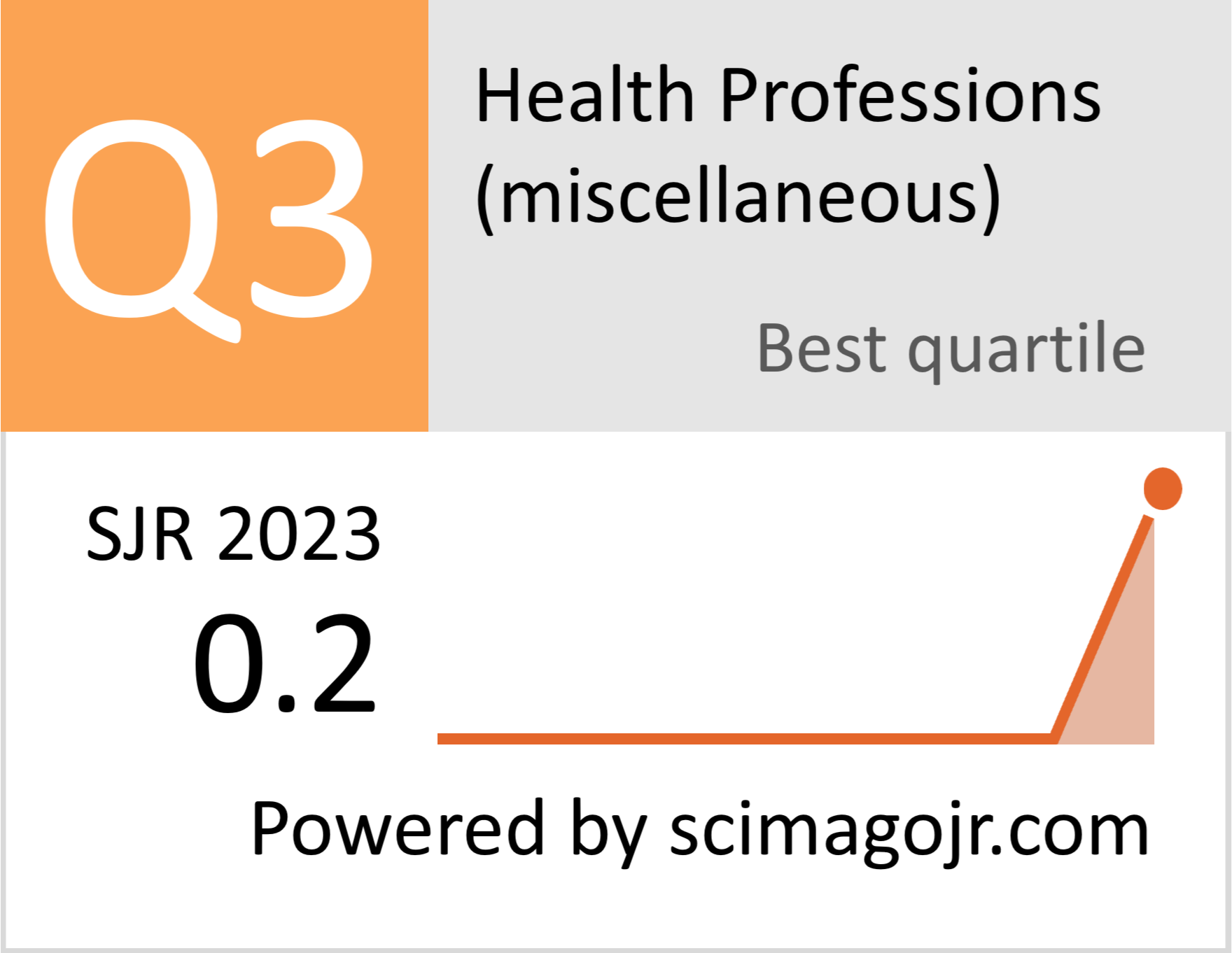Cross-Cultural Adaptation and Validation of a Generic Acceptability Questionnaire to Spanish
Adaptación transcultural y validación de un cuestionario genérico de aceptabilidad al español

This work is licensed under a Creative Commons Attribution-NonCommercial-NoDerivatives 4.0 International License.
Show authors biography
Objective. To adapt and validate the generic TFA acceptability questionnaire to Spanish.
Methods. In the initial phase of this two-phase observational study, a translation and adaptation of the original instrument was performed. The second phase consisted of applying this version to 194 older adults after a pilot hearing screening and a standard preventive medical examination. Construct validity was assessed by Exploratory Factor Analysis, and internal consistency with McDonald's omega (ω).
Results. Both procedures yielded the same two-factor solution. The first factor comprised items related to “affective attitude”, “perceived effectiveness”, “intervention coherence”, and “self-efficacy”; the second factor included items on “ethicality” and “opportunity costs”. The item 'burden' was removed due to its lack of significant factor loadings. The first factor accounted for 18.96% of the variance of the hearing screening and 26.28% of the preventive medical examination; the second accounted for 14.97% and 20.44%, respectively. Regarding reliability, the instrument demonstrated an ω = 0.61 for the hearing screening and ω = 0.73 for the preventive medical examination.
Conclusion. The final instrument comprises six items evaluating specific acceptability constructs and one item addressing overall acceptability. It features a two-factor underlying structure, demonstrating high external reliability and acceptable internal consistency.
Article visits 218 | PDF visits 24
- Sung M, He J, Zhou Q, Chen Y, Ji JS, Chen H, et al. Using an Integrated Framework to Investigate the Facilitators and Barriers of Health Information Technology Implementation in Noncommunicable Disease Management: Systematic Review. J Med Internet Res [Internet]. 2022;24(7):e37338. doi: https://doi.org/10.2196/37338
- Carlfjord S, Lindberg M, Bendtsen P, Nilsen P, Andersson A. Key factors influencing adoption of an innovation in primary health care: a qualitative study based on implementation theory. BMC Fam Pract [Internet]. 2010;11:60. doi: https://doi.org/10.1186/1471-2296-11-60
- Watson DP, Adams EL, Shue S, Coates H, McGuire A, Chesher J, et al. Defining the external implementation context: An integrative systematic literature review. BMC Health Serv Res [Internet]. 2018;18(1):209. doi: https://doi.org/10.1186/s12913-018-3046-5
- Klaic M, Kapp S, Hudson P, Chapman W, Denehy L, Story D, et al. Implementability of healthcare interventions: an overview of reviews and development of a conceptual framework. Implement Sci [Internet]. 2022;17(1):10. doi: https://doi.org/10.1186/s13012-021-01171-7
- Sekhon M, Cartwright M, Francis JJ. Acceptability of healthcare interventions: An overview of reviews and development of a theoretical framework. BMC Health Serv Res [Internet]. 2017;17(1):88. doi: https://doi.org/10.1186/s12913-017-2031-8
- Perski O, Short CE. Acceptability of digital health interventions: embracing the complexity. Transl Behav Med [Internet]. 2021;11(7):1473-80. doi: https://doi.org/10.1093/tbm/ibab048
- Casale M, Somefun O, Haupt Ronnie G, Desmond C, Sherr L, Cluver L. A conceptual framework and exploratory model for health and social intervention acceptability among African adolescents and youth. Soc Sci Med [Internet]. 2023;326:115899. doi: https://doi.org/10.1016/j.socscimed.2023.115899
- Park SY, Nicksic Sigmon C, Boeldt D. A Framework for the Implementation of Digital Mental Health Interventions: The Importance of Feasibility and Acceptability Research. Cureus [Internet]. 2022;14(9):e29329. doi: https://doi.org/10.7759/cureus.29329
- Hosking R, O’connor SY, Wangdi K, Kurscheid J, Lal A. Acceptability measures of water, sanitation and hygiene interventions in low-and middle-income countries, a systematic review. PLoS Negl Trop Dis [Internet]. 2022;16(9):e0010702. doi: https://doi.org/10.1371/JOURNAL.PNTD.0010702
- Moore GF, Audrey S, Barker M, Bond L, Bonell C, Hardeman W, et al. Process evaluation of complex interventions: Medical Research Council guidance. BMJ [Internet]. 2015;350:h1258. doi: https://doi.org/10.1136/bmj.h1258
- Skivington K, Matthews L, Simpson SA, Craig P, Baird J, Blazeby JM, et al. A new framework for developing and evaluating complex interventions: Update of Medical Research Council guidance. BMJ [Internet]. 2021;374:n2061. doi: https://doi.org/10.1136/bmj.n2061
- Sekhon M, Cartwright M, Francis JJ. Development of a theory-informed questionnaire to assess the acceptability of healthcare interventions. BMC Health Serv Res [Internet]. 2022;22(1):279. doi: https://doi.org/10.1186/s12913-022-07577-3
- Jiménez D, Lavados M, Rojas P, Henríquez C, Silva F, Guillón M. Evaluación del minimental abreviado de la evaluación funcional del adulto mayor (EFAM) como screening para la detección de demencia en la atención primaria. Rev Med Chil [Internet]. 2017;145(7):862-8. doi: https://doi.org/10.4067/s0034-98872017000700862
- Unitron Hearing Limited. uHear Kiosk [Mobile App]. 2016 [cited 2023 Dec 31]. Available from: https://apps.apple.com/co/app/uhear-kiosk/id1097960307
- Ministerio de Salud. Orientación técnica para la atención de salud de las personas adultas mayores en atención primaria [Internet]. Ministerio de Salud, Gobierno de Chile; 2014. 108 p.
- Hair JF, Black WC, Babin BJ, Anderson RE. Multivariate data analysis. 8th ed. Hampshire: Cengage Learning; 2019. 813 p.
- Dunn TJ, Baguley T, Brunsden V. From alpha to omega: A practical solution to the pervasive problem of internal consistency estimation. Br J Psychol [Internet]. 2014;105(3):399-412. doi: https://doi.org/10.1111/bjop.12046
- Kaiser HF. The application of electronic computers to factor analysis. Educational and psychological measurement [Internet]. 1960;20(1):141-51. doi: https://doi.org/10.1177/001316446002000116
- Cattell RB. The Scree Test For The Number Of Factors. Multivariate Behav Res [Internet]. 1966;1(2):245-76. doi: https://doi.org/10.1207/s15327906mbr0102_10
- Horn JL. A rationale and test for the number of factors in factor analysis. Psychometrika [Internet]. 1965;30:179-85. doi: https://doi.org/10.1007/BF02289447
- Haydon HM, Major T, Kelly JT, Catapan SC, Caffery LJ, Smith AC, et al. Development and validation of the Digital Health Acceptability Questionnaire. J Telemed Telecare [Internet]. 2023;29(10-Suppl):8S-15S. doi: https://doi.org/10.1177/1357633X231202279
- Timm L, Annerstedt KS, Ahlgren JÁ, Absetz P, Alvesson HM, Forsberg BC, et al. Application of the Theoretical Framework of Acceptability to assess a telephone-facilitated health coaching intervention for the prevention and management of type 2 diabetes. PLoS One [Internet]. 2022;17(10):e0275576. doi: https://doi.org/10.1371/journal.pone.0275576
- Lamb R, Firestone JB, Ardasheva Y. A computational modeling of rapid attitude formation during surveys about immigrants and immigration. Computers in Human Behavior [Internet]. 2016;63:179-88. doi: https://doi.org/10.1016/j.chb.2016.05.031
- Höhne JK, Schlosser S, Krebs D. Investigating Cognitive Effort and Response Quality of Question Formats in Web Surveys Using Paradata. Field Methods [Internet]. 2017;29(4):365-82. doi: https://doi.org/10.1177/1525822X17710640
- Dolnicar S, Grün B. Does one size fit all? The suitability of answer formats for different constructs measured. Australasian Marketing Journal [Internet]. 2009;17(1):58-64. doi: https://doi.org/10.1016/j.ausmj.2009.04.001
- Clark LA, Watson D. Constructing validity: New developments in creating objective measuring instruments. Psychol Assess [Internet]. 2019;31(12):1412-27. doi: https://doi.org/10.1037/pas0000626
- Tabachnik BG, Fidell LS. Using multivariate statistics. 7th ed. New York: Pearson; 2019. 848 p.



